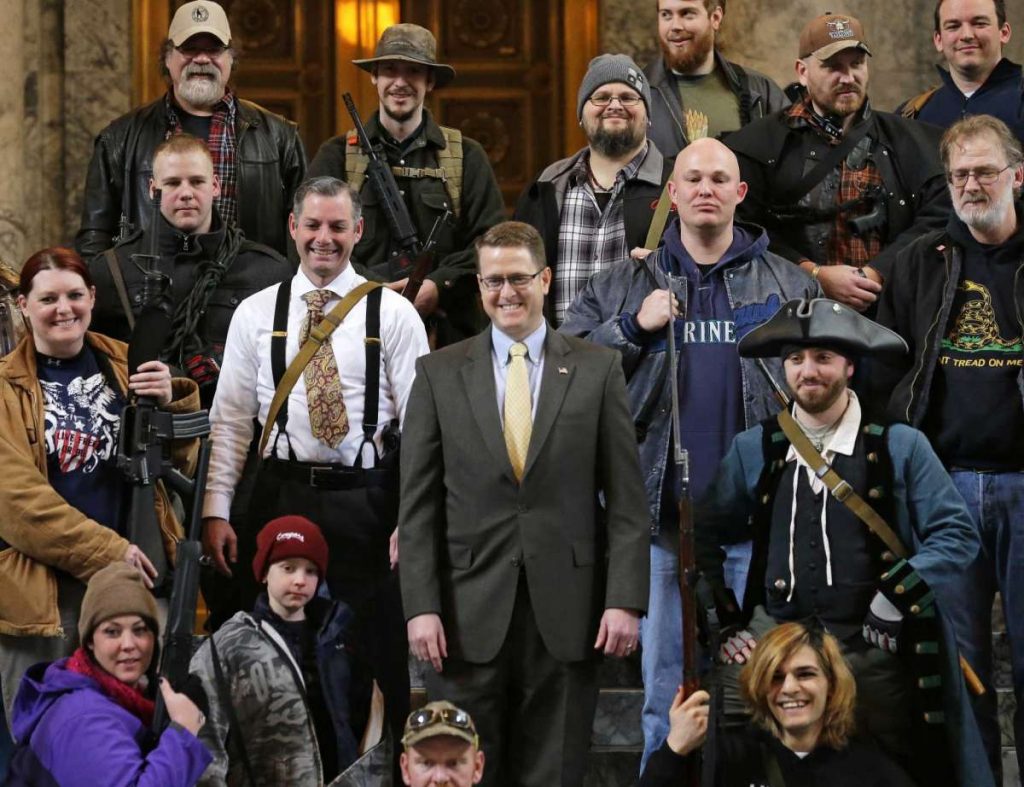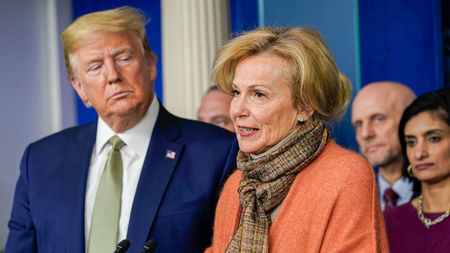You can be forgiven if you missed a story a few weeks back that in more normal times would have received a great deal more attention. The details seem particularly important in Idaho and in the Pacific Northwest, but certainly no political figure in Idaho – or the region for that matter – has been drawing attention to the testimony of FBI director Christopher Wray.
“Racially motivated violent extremism,” mostly from white supremacists, constitutes a majority of domestic terrorism threats, Wray testified before the House Homeland Security Committee on September 17. The FBI director also said, “We certainly have seen very active — very active — efforts by the Russians to influence our election in 2020,” specifically “to both sow divisiveness and discord, and I think the intelligence community has assessed this publicly, to primarily to denigrate Vice President Biden in what the Russians see as a kind of an anti-Russian establishment.”

So, the Russians are doing it again, according to the Donald Trump appointed FBI director, and violence from white supremacist groups is the most serious domestic terrorism threat.
A few days after Wray’s testimony, and after a whistle blower complaint alleged an effort to cover up another assessment of the danger of white supremacist violence, the Department of Homeland Security (DHS) released its own threat assessment. “I am particularly concerned about white supremacist violent extremists who have been exceptionally lethal in their abhorrent, targeted attacks in recent years,” said acting DHS director Chad Wolf.
Because Idaho, and the Pacific Northwest more generally, has a particularly long and ugly history dealing with white supremacy let’s focus on what the FBI and DHS say is the single biggest threat when it comes to domestic terrorism – radicalized white guys with guns.
As Seattle journalist Knute Berger wrote more than two years ago in Seattle Magazine: “The Pacific Northwest has long been a sought-after enclave for people with extreme views and utopian, or dystopian, fantasies. On the far right this has included wannabe Nazis, dating back at least to the 1930s, when fascist William Dudley Pelley of the so-called Silver Shirts declared himself America’s Hitler and ran a campaign for president from Seattle in 1936. In the ’80s and ’90s, the Nazi presence emerged with various groups in Washington and what some dubbed ‘the Fourth Reich of Idaho.’”
Most in Idaho celebrated twenty years ago when the neo-Nazi Aryan Nation’s lost a multi-million-dollar jury trial and ended up in bankruptcy. The Coeur d’Alene Press celebrated the outcome as a “victory for justice” that “corrected the misconceptions about Idaho and its people,” but that assessment now seems outdated, if not flat wrong.
Far right agitator Ammon Bundy who led an armed takeover of a federal facility in eastern Oregon now roams Idaho at will, enjoying support from elected Republican officeholders. Bundy and some of his followers went armed recently to the Idaho Statehouse to intimidate and disrupt lawmakers. They caused physical damage but received only mild rebukes.
In August the Idaho Statesman published a long piece based on “interviews, acquired emails and letters, and a review of social media profiles” documenting the ties of various Idaho GOP elected officials “to groups like the Three Percenters, the Oath Keepers and the American Redoubt movement.” The newspaper noted that “Tom Luna, chairman of the Idaho Republican Party, did not respond to requests for comment, nor did many elected officials whose ties to militia groups or extremist ideologies” who were mentioned in the story.
Washington state representative Matt Shea, a Spokane Valley Republican and a leader in the so called Patriot Movement who has his own ties to Idaho Republicans, eventually decided not to seek re-election this year after it was disclosed that he “planned, engaged in and promoted a total of three armed conflicts of political violence against the United States Government in three states outside the state of Washington over a three-year period.”

Now comes news that a militant group – the Wolverine Watchmen – plotted to kidnap and try for treason the governors of Michigan and Virginia. The FBI broke up the plot and indicted six men. “The Wolverine Watchmen are not a Second Amendment militia or constitutional patriots in any sense of the word,” says John E. Finn, an emeritus professor at Wesleyan University who has studied these groups. “If they are guilty of the charges brought against them, then they are terrorists.”
It requires minimal dot connecting to trace the arc of presidential pronouncements – “You also had some very fine people on both sides,” Donald Trump said after the white supremacy march and deadly violence in Charlottesville, Virginia in 2017 – to the vast increase in right wing and often white supremacist violence. The president has also repeatedly vilified Muslims and people of color, including many elected officials.
You have to wonder why it’s become so difficult for Republican elected officials to connect these dots and avoid the “both sides” whataboutism argument about these threats to democracy and order. Idaho congressman Mike Simpson fell down this rabbit hole this week in an interview with Idaho Public Television’s Marcia Franklin.
Do you condemn white supremacy, Franklin asked Simpson? “Absolutely, absolutely,” he said, before instantly pivoting to a full-on attack on the Black Lives Matter movement and “these people” who “are out burning down our cities and stuff, that’s a problem.”
It’s possible, indeed intellectually honest, as Simpson must know to condemn the senseless property damage of protests in Portland and elsewhere and still acknowledge that there is a profound and long overdue racial reckoning taking place in the United States. You can condemn violence, including white supremacist and “militia” violence, and still believe that racism must be addressed. No once, even in passing, did Simpson make the connection.
Franklin twice asked the 22-year House member if it was possible Donald Trump had contributed to “this type of rhetoric and behavior.” Simpson, with more than a minor pained expression on his face, said, “I don’t think he is.”
Then he again immediately shifted to Trumpian talking points, amplified a Fox News conspiracy theory and mispronounced the name of the woman of color running for vice president.
“I think what emboldens these people is when they get arrested and then you have the potential vice president of the United States, Kamala Harris, and her, some of her campaign staff putting, and encouraging other people to put funds into a fund to bail these people out that are out burning down out cities, and stuff, that what encourages these people. You have to stand up to these people.”
For the record that is a gross misrepresentation of Harris’s action, but the real point is you have to stand up to these people – unfortunately these days that means a Republican like Congressman Simpson.
—–0—–
Additional Reading:
A few stories I’ve found of interest this week…
How Dr. Birx Screwed up the CDC
Science magazine had a detailed story this week about how Dr. Deborah Birx, the head of the White House task force charged with leading the government’s response to the COVID-19 pandemic, undercut the work of the scientists at the Centers for Disease Control (CDC).

I know it’s a lot to ask, but it would be nice if someone in at the highest levels of the federal government really had a plan to get us through this crisis.
“When Birx, a physician with a background in HIV/AIDS research, was named coordinator of the task force in February, she was widely praised as a tough, indefatigable manager and a voice of data-driven reason. But some of her actions have undermined the effectiveness of the world’s preeminent public health agency, according to a Science investigation. Interviews with nine current CDC employees, several of them senior agency leaders, and 20 former agency leaders and public health experts—as well as a review of more than 100 official emails, memos, and other documents—suggest Birx’s hospital data takeover fits a pattern in which she opposed CDC guidance, sometimes promoting President Donald Trump’s policies or views against scientific consensus.”
Here’s a link to the piece.
Can We Do Nuclear?
Do you believe the climate is changing? That fossil fuels contribute? What do we do to power a modern industrial economy and still respond effectively to the climate crisis?
Many people are saying, even some environmentalists, that we must double down on nuclear power. But, what about the waste? What about the dangers?
“If we cannot make headway on nuclear power — and do so democratically — there would seem to be little hope for similarly complex challenges: climate change, artificial intelligence, collapsing biodiversity, sending humans to Mars. We must end the nuclear stalemate. Whether we can is a crucial test for democracy, and for humanity.”
A provocative read here.
Black Swans, Slim Chances, and the 2020 Presidential Election
An always worthwhile read from Rebecca Solnit.
“The tricky thing about hope is to not confuse it with optimism. Optimism is confidence that you know the future and it requires nothing of you. It’s a mirror image of pessimism, which likewise assumes it knows the future, only pessimism’s future is dismal and not up to us either. Hope is a sense of possibility within the uncertainty of a future that does not yet exist, but that we are making by our actions (and yeah, those we loathe and oppose are making by theirs: case study, the ramming through of Amy Coney Barrett’s supreme court nomination and all that voter suppression).”
Read the entire piece.
Thanks for following along here. Be well.



